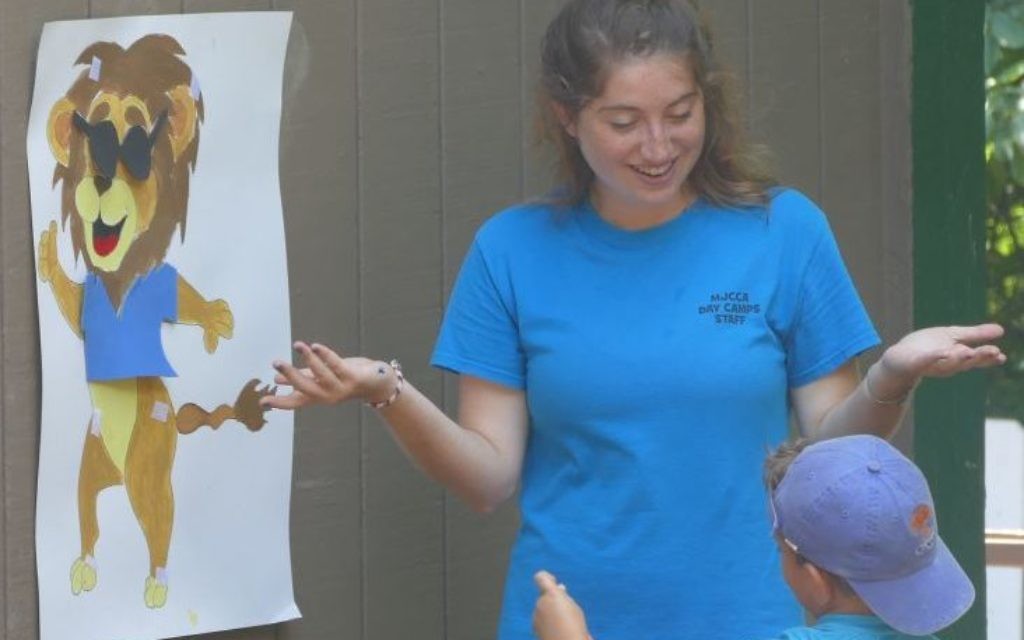Hebrew Immersion Camp Builds Bond to Judaism
The Marcus JCC has one of nine such programs at day camps in North America.

Hebrew immersion programs at Jewish day camps offer benefits that persuade some parents to enroll their kids every summer.
Learning Hebrew helps kids connect with Israel and their Judaism, Camp Isidore Alterman Director Abby Paulson said. The Marcus Jewish Community Center helps build that bridge at Isidore Alterman through its Hebrew immersion program, Gesher.
As one of nine day camps in North America running Hebrew immersion programs, the camp hires staff members who speak only Hebrew during everyday camp activities such as arts and crafts, archery, sports, and swimming.
Get The AJT Newsletter by email and never miss our top stories Free Sign Up
The immersion program works with campers from kindergarten through third grade and runs four or eight weeks alongside Isidore Alterman’s traditional day camp.
Gesher stems from the national Hebrew immersion program Kayitz Kef (summer of fun). In addition to the Marcus JCC’s Dunwoody campus, the program operates at JCC camps in Palo Alto, Calif., Toronto, Chicago, Detroit and Cleveland and at Ramah camps in Nyack, N.Y., Philadelphia and Washington.
The program, which is supported by the Areivim Philanthropic Group, the Foundation for Jewish Camp and the Marcus Foundation, has grown every year since its inception four years ago, Paulson said.
That growth has come with few setbacks, she said. Only one person has dropped out, after deciding that the program was not a good fit.
“While it is a very intense program, the kids and parents know that going into it,” she said.
Paulson said counselors come from Israel for this program, and because they spend so much time with the campers, they work on whatever challenges the campers may have and create an unparalleled bond.
That bond extends beyond the camp, Paulson said, to each camper’s family. “We sometimes have families invite the counselors and kids for a barbecue or a pool party because they share a unique connection.”
Because many of the campers attend a Jewish day school or have one or two Israeli parents, they are not likely to forget the language during the school year, Paulson said. “They are not going home having long-winded conversations, but they are able to pick up words and phrases which they pronounce a month after they have left the program.”
Paulson said the JCC’s facilities and the program pair well to offer the opportunity to learn Hebrew in an immersive environment, something not all organizations can provide.
“The kids not only have access to the pools, ropes and archery, but also different activities they can do with the added value of Hebrew,” she said.
There are many different reasons the Hebrew immersion program is useful, Paulson said. “Some may want to retain the language outside school, or parents may want their children exposed to another language. But at the end of the day, it may be because parents want more than just a day camp for their kids. They want an experience, which they certainly receive at Gesher.”
There is a difference between Hebrew immersion and Hebrew infusion, said Hebrew Union College-Jewish Institute of Religion contemporary studies professor Sarah Bunin Benor, who has a background in linguistics and Jewish studies and is writing a book with Brandeis University associate professor Jonathan Krasner and research affiliate Sharon Avni: “Hebrew Infusion: Language and Community at American Jewish Summer Camps.”
Benor, who delivered Emory University’s Tenenbaum Family Lecture in 2015, said immersion is a technique educators use to engage participants through intensive hearing and speaking methods, while infusion is the process of incorporating elements of a specific language into an environment that is primarily conducted in another language. Immersion creates precision, but she said infusion builds a connection to the language.
But Benor said immersion is much more effective in creating Hebrew proficiency because camps tend to use the language for many activities and announcements.
“I think a lot of Jewish parents see Hebrew as a special language,” she said, “and the importance of Hebrew knowledge as a way to understand Jewish textual traditions as well as a connection to Israel and Jews all over the world.”




comments